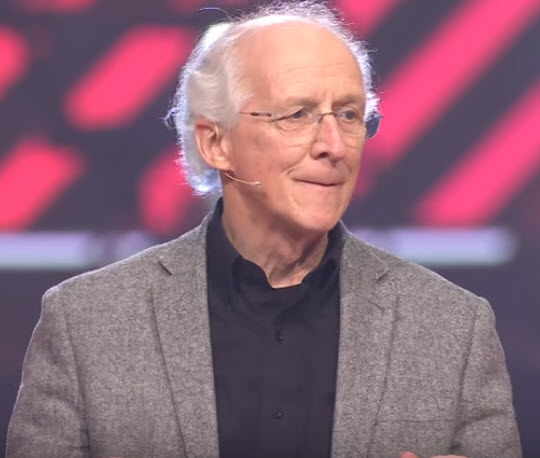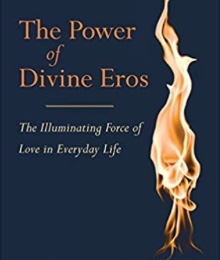John Piper delivers his sermon, ‘Live for Your Greatest Desire – Jesus’, to 65,000 young people at Passion 2020. He is clear about the purpose of his address. He prays: ‘Father I ask now that the miracle of the new birth, the miracle of the awakening of a supreme desire for Jesus above all things, would be granted to thousands.’ His prayer is that thousands of young unbelievers in the large Passion audience might experience the miracle of the new birth, which he equates with ‘the awakening of a supreme desire for Jesus above all things.’

In the third chapter of John’s gospel Jesus explains the new birth to Nicodemus. He said, ‘Unless one is born again he cannot see the kingdom of God’ (John 3.3). Jesus continues, ‘as Moses was lifted up in the wilderness, even so must the Son of Man must be lifted up, that whoever believes in Him should not perish but have eternal life. For God so loved the world that He gave His only begotten Son, that whoever believes in Him should not perish but have everlasting life’ (John 3.14-16). So the new birth is granted to those who place their faith in the crucified Christ, and are indwelt by God’s Holy Spirit.
But Piper’s understanding of the new birth is different from that of Jesus. He says: ‘To be born again is to taste that God is more to be desired than anything; that’s what it means to be born again. The creation of a desire for God greater than the desire for anything else, is to be a Christian. It’s a miracle, you can’t make it happen. Nothing is more important in your life than the awakening of this desire.’ Piper’s assertion that we must awaken our desire for God to be born again is vastly different from the teaching of Jesus.
Piper mentions that over the years he has heard two objections to his doctrine on the new birth. The first objection is that he is making a God out of desire. ‘Even if you say, it’s a desire for God, you’re still making so much of your desire, the state of your own heart.’ Piper says that ‘probably hundreds of thousands of people around the world are lamed in their relation to God by the suspicion that desire is a dangerous ally in worship’.
The first objection
Piper deals with the first objection by turning to Mark 8.34-35. “If anyone would come after me let him deny himself and take up his cross and follow me” (v34). He says: ‘I’m gonna argue from the way Jesus argues, that this text is not only not a problem for what I’m saying, it’s the basis of what I’m saying. Now I know that sounds backwards, how can Jesus’ teaching that we should deny ourselves actually teach we should indulge our desire for God. How can he be teaching that? That’s exactly what it teaches. We’ll see it in just a moment; let me state the premise and the big picture first then we look at it in the text.’
And then Piper makes an unbiblical assertion. ‘All Christian self-denial is for the sake of ultimate internal satisfaction in God.’ He continues: ‘The effort to deny yourself God as your supreme desire is idolatry, blasphemy.’
Piper boldly tells his young audience: ‘God offers himself in this stadium right now. Through his word, by his Spirit, he offers Himself to us as the infinitely valuable, infinitely beautiful, all satisfying treasure of the universe, for your full and everlasting pleasure.’ Piper is saying that God offers Himself as a treasure which can satisfy the everlasting pleasure of the Passion audience.
To justify this claim Piper quotes one verse from Psalm 16, completely out of context. ‘In your presence God, there is fullness of joy, at your right hand are pleasures forevermore’ (Psalm 16.11). He offers this interpretation. ‘Full and forever, you can’t improve on that, there’s nothing fuller than full, there’s nothing longer than forever. If we turn away from that offer, if we turn away from the offer of everlasting pleasure in the presence of God as the fulfilment of our lifelong desire, if we turn away from that and say, “No God, Jesus taught me to deny myself I cannot accept that offer to pursue you as my full and lasting pleasure”, we are idolaters.’
Piper is misusing Psalm 16 to promote his false philosophy of Christian Hedonism. The apostle Peter, in his sermon on the day of Pentecost, quotes Psalm 16 in context. He explains that Jesus was handed over to sinful men by the deliberate plan and foreknowledge of God to put him to death, by nailing him to the cross. Then God raised him from the dead. David said about him, quoting Psalm 16.
‘For you will not abandon my soul to Hades, or let your Holy One see corruption.
You have made known to me the paths of life; you will make me full of gladness with your presence.’ (Acts 2.27-28).
Notice that the apostle Peter has used a different translation of these verses, for he has quoted these verses from the Septuagint. His purpose is to explain the reality of Jesus’ resurrection. It is the risen, victorious Christ who has been filled with the joy of His Father’s presence. Apostle Paul quoted Psalm 16.10 as evidence that Jesus, the Holy One of God, will not see corruption (Acts 13.35). Therefore the last two verses of Psalm 16 apply directly to Christ and are not an offer from God to supply full and everlasting pleasure to the Passion audience, as Piper claims.
Piper’s assumption is that Christians are motivated by the desire for pleasure in God; that we serve God because of what we get out of it, namely, eternal pleasure. But this is wrong; the reason Christians serve God is because they love Him and want to obey Him. He is our gracious, loving, merciful Heavenly Father who gave His Son, Jesus Christ, to die for our sins on the Cross of Calvary. ‘We love him, because he first loved us’ (1 John 4.19).
The climax of the apostle Peter’s Pentecost sermon was to call the gathered crowd to repentance. Peter said unto them, ‘Repent, and be baptized every one of you in the name of Jesus Christ for the remission of sins, and ye shall receive the gift of the Holy Ghost’ (Acts 2.38).
Piper does not call his large Passion audience to repentance. Rather he offers God as a treasure which can satisfy their everlasting pleasure. But the message of Scripture could not be clearer. God commands all people, everywhere to repent of their sin and to turn to Christ in faith. ‘These times of ignorance God overlooked, but now commands all men everywhere to repent, because He has appointed a day on which He will judge the world in righteousness by the Man [Christ] whom He has ordained. He has given assurance of this to all by raising Him from the dead’ (Acts 17.30-31). Note, God commands repentance—only those who turn toward God in repentance and toward our Lord Jesus Christ in faith, can be born again (Acts 20.21).
The second objection
In his best-selling book Desiring God,Piper writes, ‘the pursuit of pleasure is an essential motive for every good deed. If you abandon the pursuit of full and lasting pleasure, you cannot love people or please God’ (DG p112). And again: ‘The pursuit of pleasure is an essential motive for every good deed. If you aim to abandon the pursuit of full and lasting pleasure, you cannot love people or please God’ (Dangerous Duty, p39).
He acknowledges two kinds of love, agape and eros. Agape love is mentioned in the New Testament 106 times and describes the sacrificial love of the God who is love (1 John 4.16). Agape is a love that gives freely and selflessly. Indeed, the full depth of divine agape is revealed in the incarnation of Jesus Christ and the Cross of Calvary. It expresses the true nature of God—and the children of God love others, even their enemies, because they take after their heavenly Father. Agape love can be known only from the self-giving, self-sacrificing actions it prompts. God’s love is seen in the gift of His Son. Christian love has God for its primary object and expresses itself in implicit obedience to His commandments. Jesus said: ‘If ye love me, keep my commandments’ (John 14.15).
Eros love is not mentioned in the New Testament. It is the love of desire, an acquisitive love that is self-seeking. Piper recognises the difficulty that agape love causes for his Christian Hedonism, which tells us that the pursuit of pleasure is an essential motive for every act of love.
He believes that man loves God because of the treasure, joy and future reward that is in it for them. He raises the question: ‘Should we not infer that in the painful work of redeeming love, God is very interested in the satisfaction that comes from His efforts and that he does demand the pleasure of a great return on His sacrifice?’ This false assertion is essential for Piper’s Christian Hedonism, which insists that all love is fundamentally motivated by the pursuit of pleasure. Piper claims that conceptually agape and eros resolve into one kind of love at root. He writes, ‘God’s agape does not “transcend” His eros, but expresses it.’ By this he means that the love of God, and the only love of man that will please God, are both at root erotic, motivated for self-pleasure. And so Piper coins a new definition of love, one that combines both agape and eros—‘holy, divine eros’ (DG, footnotep124). Piper simply rejects the traditional understanding of God’s love revealed in the New Testament.
Piper takes his audience to Hebrews 12 verses 1-2, to support this claim. ‘Show me what you did Jesus, show me how you did it; model for me how to do this, “looking to Jesus the founder and perfecter of our faith, who for the joy that was set before him endure the cross, despising the shame and is seated at the right hand of God”.’ He says that ‘in the history of the world there never has been an act of love greater than the act of Jesus dying for his enemies that they might be saved. There’s never been a greater, there never will be a greater act of love. So the question is, alright, if that was the greatest act of love how did he have the strength to do it?’ In other words, what motivated Christ to go to the Cross?
But Scripture teaches that Christ suffered and died on the Cross in obedience to His heavenly Father. In the Garden of Gethsemane, Jesus ‘knelt down and prayed, “Father, if it is Your will, take this cup away from Me; nevertheless not My will, but Yours, be done.”’ (Luke 22.41-42). And so, ‘by the obedience of Jesus shall many be made righteous’ (Romans 5.19). To obtain the joy God had planned for him, Jesus obediently suffered the agony of death on a cross. The joy of Christ is the result of obeying his Father’s will to sacrifice his life in order to redeem a people for God. Jesus accepted the anguish of the Cross in the certain knowledge that those who place their faith in his blood shed on Calvary, will know the great joy of sins forgiven, and the certainty of everlasting life in the presence of God. God destined the path of suffering for Jesus, and afterwards filled him with joy. The phrase ‘for the joy set before him’ relates to Jesus’ exaltation when he was glorified after his death on the cross. He was raised from the dead by the power of God and ascended into heaven to be seated at the right hand of the throne of God. He is worshipped as the Lamb of God who takes away the sin of the world. In heaven they sang a new song, saying: ‘For You were slain, And have redeemed us to God by Your blood Out of every tribe and tongue and people and nation’ (Revelation 5.9).
Piper’s error
John Piper is using the Passion Conference to promote his man-made, concept of Christian Hedonism among young people. In doing so, he teaches two major theological errors. First, he presents a false view of the new birth, asserting that we are born again by awakening a supreme desire for God. But Piper is perverting God’s Word, for the Bible teaches that we are born again by turning towards God in repentance and placing our faith in Jesus Christ. He does not call sinners to repentance.
Piper’s second error is to deny the biblical meaning of God’s agape love, replacing it with the love of desire, which he labels ‘holy divine eros’. Thousands of young people are being misled by the Passion movement which provides a platform for Piper’s false teaching.
The real challenge of the Christian life is not to ‘desire’ God as the source of hedonistic pleasure. Rather it is to love of God and keep His commandments (1 John 5.3). We are called to ‘be holy and without blame before Him in love’ (Ephesians 1.3). We are to ‘walk worthy of the Lord, fully pleasing Him, being fruitful in every good work and increasing in the knowledge of God’. (Colossians 1.10).
We must conclude that Piper’s desire sermon is distorting the true Gospel of Christ. Scripture gives us this warning: ‘Beware lest anyone take you captive through philosophy and empty deceit, according to the tradition of men, according to the basic principles of the world, and not according to Christ’ (Colossians 2.8)










